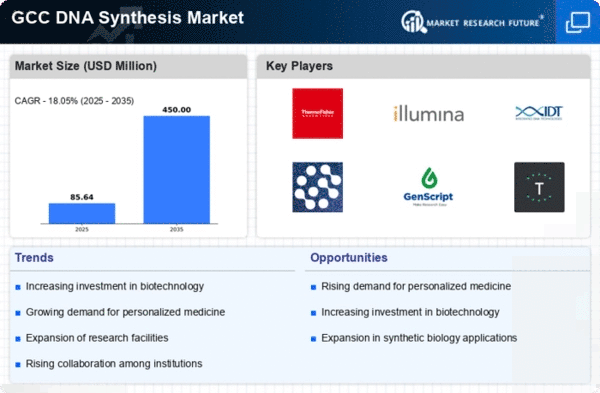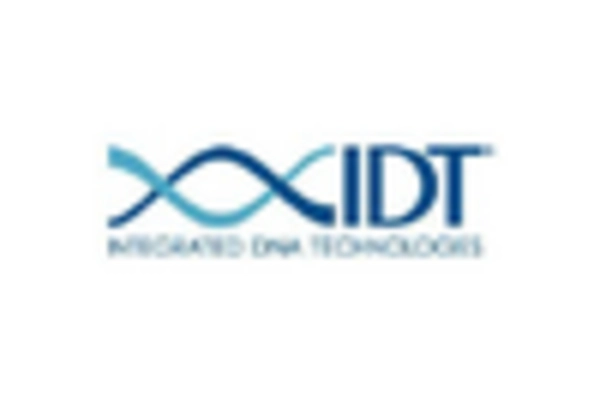Collaborations and Partnerships
Collaborations between academic institutions, research organizations, and private companies are becoming increasingly prevalent in the GCC, significantly influencing the DNA Synthesis Market. These partnerships are often aimed at advancing research in synthetic biology and genetic engineering, leading to the development of innovative products and services. For instance, joint ventures between universities and biotech firms are facilitating the sharing of knowledge and resources, which is essential for driving advancements in dna synthesis technologies. Such collaborations may also attract foreign investment, further enhancing the capabilities of the local dna synthesis market. As these partnerships continue to grow, they are likely to foster a more dynamic and competitive environment, ultimately benefiting the entire industry.
Expansion of Research Institutions
The establishment and expansion of research institutions in the GCC are significantly impacting the DNA Synthesis Market. Universities and research centers are increasingly focusing on genetic research and synthetic biology, leading to a higher demand for dna synthesis services. For example, several universities in the region have launched dedicated programs in biotechnology and molecular biology, which are expected to produce a skilled workforce adept in dna synthesis techniques. This academic focus is likely to stimulate collaboration with industry players, thereby enhancing the overall capabilities of the dna synthesis market. Furthermore, government initiatives aimed at promoting research and innovation are expected to bolster funding for these institutions, facilitating further advancements in dna synthesis technologies.
Growing Applications in Healthcare
The healthcare sector in the GCC is witnessing a growing reliance on dna synthesis technologies for various applications, including personalized medicine, diagnostics, and therapeutics. The increasing prevalence of genetic disorders and chronic diseases is driving demand for tailored treatment solutions, which often require custom dna synthesis. The market for personalized medicine is expected to grow at a CAGR of over 15% in the coming years, indicating a robust opportunity for the DNA Synthesis Market. Additionally, advancements in gene editing technologies, such as CRISPR, are further propelling the need for precise dna synthesis, as these tools require high-quality synthetic dna for effective application in clinical settings.
Rising Investment in Biotechnology
The DNA Synthesis Market in the GCC is experiencing a surge in investment, particularly from both public and private sectors. Governments are increasingly recognizing the potential of biotechnology to drive economic growth and improve healthcare outcomes. For instance, the GCC countries have allocated substantial budgets towards research and development in biotechnology, which is projected to reach approximately $1.5 billion by 2026. This influx of capital is likely to enhance the capabilities of local firms in the dna synthesis market, enabling them to innovate and expand their product offerings. Furthermore, the establishment of biotechnology parks and incubators in the region is fostering collaboration between academia and industry, thereby accelerating advancements in dna synthesis technologies.
Increased Focus on Agricultural Biotechnology
Agricultural biotechnology is emerging as a key driver for the DNA Synthesis Market in the GCC. With the region facing challenges related to food security and sustainable agriculture, there is a growing interest in developing genetically modified crops that can withstand harsh environmental conditions. The dna synthesis market is poised to benefit from this trend, as the creation of genetically engineered plants often requires sophisticated dna synthesis techniques. The GCC countries are investing in research to develop crops that are drought-resistant and pest-resistant, which could potentially enhance agricultural productivity by up to 30%. This focus on agricultural innovation is likely to create new opportunities for companies operating within the dna synthesis market.
















